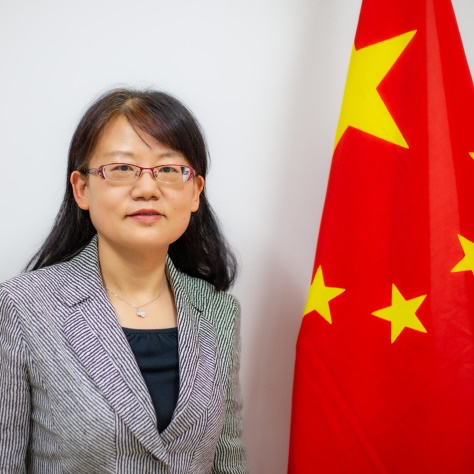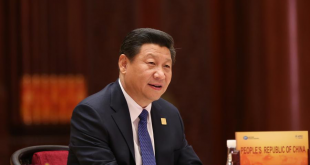Published: November 11,2022
By Xing Yuchun

Ms Xing Yuchun
The world economy is currently in extreme difficulty unseen for many years, and some countries even fell into a crisis. Covid-19 has hanged on for more than two years, bringing a tremendous impact to global economy. To make things worse, a supply chain crisis and inflation at global level loom as stumbling stones for world economy. What should we do to overcome the difficulty? I frequently brainstorm with my Rwandan friends on this: What’s the answer to the problem?
Development is the master key to all problems faced by today’s world. The underlying logic for that is, when livelihood of so many people in the world remains unaddressed, development should be the top priority for the world, developing countries in particular. Imbalanced development between the North and the South has perplexed the world in past years, while the gap keeps widening. Nowadays, the GDP per capita of developed countries is 9 times that of developing countries.
Against that backdrop, Chinese President Xi Jinping proposed the Global Development Initiative (GDI) at the 76th Session of the UN General Assembly in September 2021. Flowing from the vision of a community with a shared future for mankind, the GDI charts the course for global development. It aims to give new impetus to international cooperation on development, and forge a new platform of cooperation for realization of the sustainable development goal. Eight areas of practical cooperation were spelled out as follows: 1. poverty reduction 2. food security 3. pandemic response and vaccines 4. financing for development 5. climate change and green development 6. industrialization 7. digital economy 8. digital-eraconnectivity. All of them are areas calling for special focus in today’s development cause.
The GDI made great headway at the High-level Dialogue on Global Development convened in June this year. China specified 32 measures in collaboration with partners to support global development. Among them are: measures focusing on poverty reduction, including a Global Alliance for Poverty Reduction and Development (GAPRD) to promote sharing of best practices and international cooperation, and an International NGOs Network for Poverty Reduction Cooperation; measures geared for sustainable development, including a series of dialogues on development experience sharing to help developing countries enhance capacity building for sustainable development, and Seminar Series on “South-South Cooperation in Cross-Border E-commerce for Poverty Eradication and Global Sustainable Development”; measures to boost ICT industry, including ICT Capacity Building Programs for Developing Countries, the Global Development Initiative Digital Cooperation Forum and the 2022 Global Digital Economy Conference, and the United Nations World Data Forum 2023 hosted by China.
The GDI is highly compatible with the United Nations 2030 Agenda for Sustainable Development and the 2063 Agenda of Africa. Based on history and looking to the future, the 32 measures are set to bring about promising prospects for China and Rwanda’s cooperation under the umbrella of GDI.
Our bilateral cooperation in economic and trade realm has yielded substantial results in recent years, which laid a solid foundation for our cooperation in the framework of GDI.
China is a major trade partner and investor, and the largest project contractor of Rwanda. 15 cooperation agreements were signed during Chinese President Xi Jinping’s state visit to Rwanda in 2018, which cover a broad range of areas. Roads built by Chinese company account for up to 70% milage of asphalt roads all over Rwanda. The Masaka Hospital, upon completion of its expansion project, will be the largest hospital aided by China overseas. The Nyabarongo II Hydropower Plant (43.5 MW) will contribute significantly to the goal of 100% Rwandan households’ access to electricity by 2024. The Integrated Polytechnic Reginal College of Musanze, which was inaugurated in 2015 and expanded last year, is boosting the vocational education and training of Rwanda.
Rwanda is the first African country to export dried chili to China, with 50,000 tons of dried chili to be exported to China from 2021 to 2025. And stevia is expected to be another Rwanda quality specialty for Chinese giant market.
The initiatives for sustainable development could serve as a booster for Rwanda’s efforts to realize social and economic transformation, as they perfectly meet the demands from Rwanda. China encourages Rwanda to take active part in initiatives for poverty reduction, with a view to lifting more Rwandan population out of poverty. With the signing of an agreement on smart education programme in last year, cooperation on ICT between China and Rwanda is just unfolding. Rwanda could bank on initiatives for digital economy and build ICT into a pillar industry of its economy. Rwanda could also take advantage of initiatives for South-South cooperation to seek funding and bolster cooperation in areas such as cross-border e-commerce. On top of that, China is willing to make full use of its experiences and know-hows on items such as Juncao, mining and satellite-launching, to contribute to socio-economic development of Rwanda.
As a Chinese poem puts it, we must not let our vision be blocked by floating clouds. Both China and Rwanda are putting development at the top of their agenda, as the first and foremost means to improve the well-being of their people and respond to difficulties of economy. When addressing the second China-Africa Economic and Trade Expo in September last year, H. E. President Paul Kagame stated that Rwanda’s firm intention is to deepen our relationship even further in the next half-century of cooperation. With those encouraging remarks, I firmly believe that our two countries will grasp the historic opportunity presented by the GDI, strengthen the collaboration and synergy between our national development strategies, and further deepen practical cooperation for the benefits of two peoples
Ms. Xing Yuchun is Deputy Chief of Mission Chinese Embassy in the Republic of Rwanda
The story was first published on August 05, 2022.
 Africa -China Review Africa -China Cooperation and Transformation
Africa -China Review Africa -China Cooperation and Transformation
